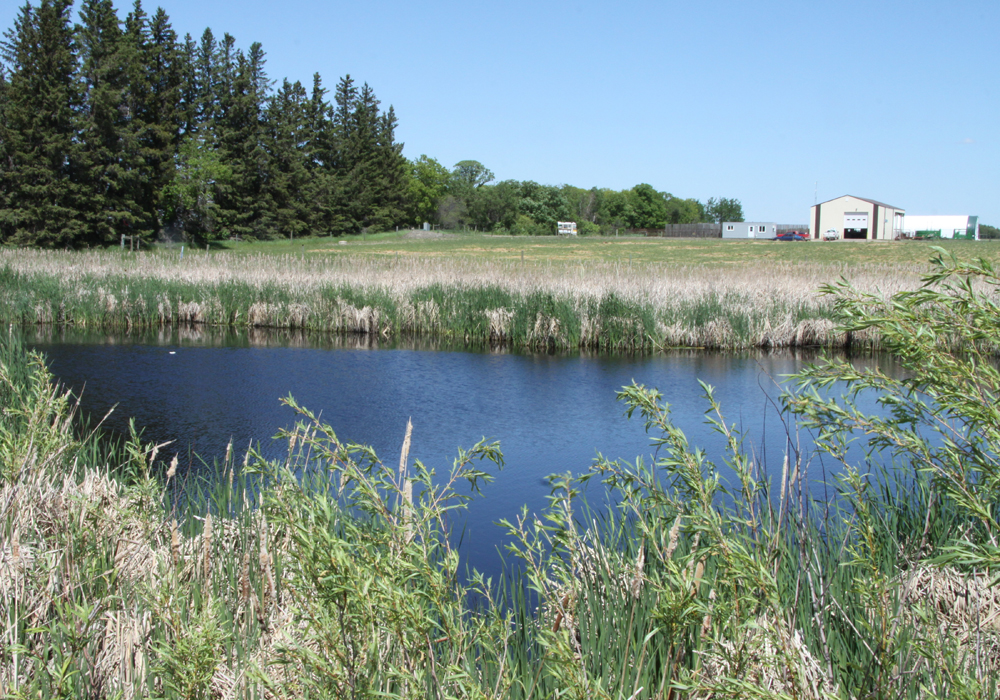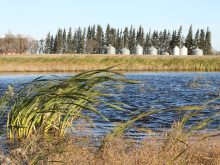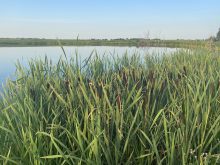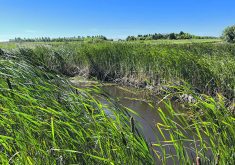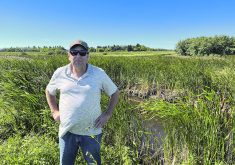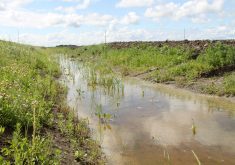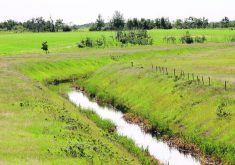Consultations on how best to mitigate agricultural drainage in Saskatchewan will take at least another 18 months, says Lyle Stewart, the legislative secretary to the Water Security Agency and former agriculture minister.
Even after that, farmers and landowners may still be at odds with each other.
Some at a WSA presentation to rural municipal councillors in Regina said the idea of permanently holding back water is wrong, while another said drainage is out of hand.
It’s a dilemma that Stewart and WSA staff hope to solve by talking to as many people as possible.
Read Also

Farming Smarter receives financial boost from Alberta government for potato research
Farming Smarter near Lethbridge got a boost to its research equipment, thanks to the Alberta government’s increase in funding for research associations.
“I just think that you need to know that it’s not our goal to shut down drainage,” Stewart said. “We have to be cautious to make sure we’re not hurting downstream landowners and that we’re not ruining the water in our lakes and rivers. And, we have to make sure that we preserve wildlife habitat.”
But he also told the councillors ahead of the Saskatchewan Association of Rural Municipalities midterm convention that more drainage is possible.
“I think we’re coming to a place where we can do some more drainage in this province,” he said. “We can retain any of the reasonable drainage that we’ve already done and meet our growth agenda and all those other environmental targets as well.”
The WSA is considering ways to retain water and wildlife habitat while still allowing farmers to drain land. Farmers in the east and southeastern parts of Saskatchewan would be most affected by a mitigation plan that would require a drainage network to retain at least 50 percent of sloughs by area if the participants are draining more than 10 acres of wetlands.
The mitigation proposals also include the possibility of a farmer providing three acres of upland habitat on bush, tame or native grass, or winter cereals for every acre of lost wetland.
Project manager Etienne Shupena-Soulodre said water quality is also an issue because there are concerns about how much phosphorus is moving in water.
One farmer at the meeting said that all crop land has to be considered habitat. He said wildlife is eating crop and damaging it so it is obviously habitat for them.
Another took issue with the idea that drainage has caused habitat loss.
“You stand there this morning and tell me that all the drainage in Saskatchewan over the years has caused loss of habitat?” said Terry Hildebrandt, reeve for the RM of Langenburg. “I disagree sir. We have not lost habitat in this province with all the drainage; there’s more there than ever, where we’re from anyways.”
He said permanent retention of water on farmland that produces food and contributes to the gross domestic product of the province shouldn’t be a consideration.
“The focus should be on how we retain water and slowly let it out so it doesn’t hurt anybody downstream … not by holding permanent water on land that we already farm,” he said.
David Zerr from the RM of Churchbridge said the WSA uses assumptions that can’t be applied to all areas.
He disagreed that drainage amplifies the effects of water in wet years. He said organizations like Ducks Unlimited say that wetlands are a solution to flooding but that is only true when it’s dry or precipitation is low.
“It’s been our experience when we’ve had the worst flood events all of the wetlands are full, the land is saturated and you get a large event and all lands are contributing including the wetlands,” he said.
Zerr said even land that is undeveloped and purely habitat can take out a road during a significant rainfall.
He added that he thinks there isn’t more phosphorus coming out of drained agricultural water than other water sources and plans to take water samples from spilling wetlands next spring.
“Another anomaly is winter cereals being considered as part of your upland habitat,” he told Shupena-Soulodre and Stewart. “When that crop residue breaks down it’s actually contributing three times as much to the soluble phosphates that you’re trying to eliminate.”
The WSA is asking for interested landowners to participate in demonstration projects while it works toward a solution.
Meanwhile, a rural councillor and farmer from west of Melville said the WSA is not dealing with the consequences of drainage to downstream landowners. He has been talking to WSA since 2011, he said.
“Sure it’s nice to have the water off the land but when guys are draining 50 quarters and there’s five-foot ditches going into your land how are we supposed to prosper?” he said. “It’s about greed and about draining water on other people’s land so they can farm 160 acres on their quarter. That’s the bottom line.”
At the convention, delegates defeated a resolution moved by the RM of Churchbridge that would have the SARM board withdraw its support of the WSA water policy and support RMs that would be adversely affected.
However, they passed another resolution from several RMs that asked SARM to reassess its recommendations to the province on the agricultural water management strategy and consult with RMs on recommendations in the future.
The resolution also asked SARM to review its support for the idea that landowners could pay a fee in lieu of retaining or restoring wetlands, re-examine its support of the policy requiring 50 percent retention of wetlands within a project, and “ensure that farmers’ rights to manage water on their land and make improvements on their land be considered when making water management decisions.”




